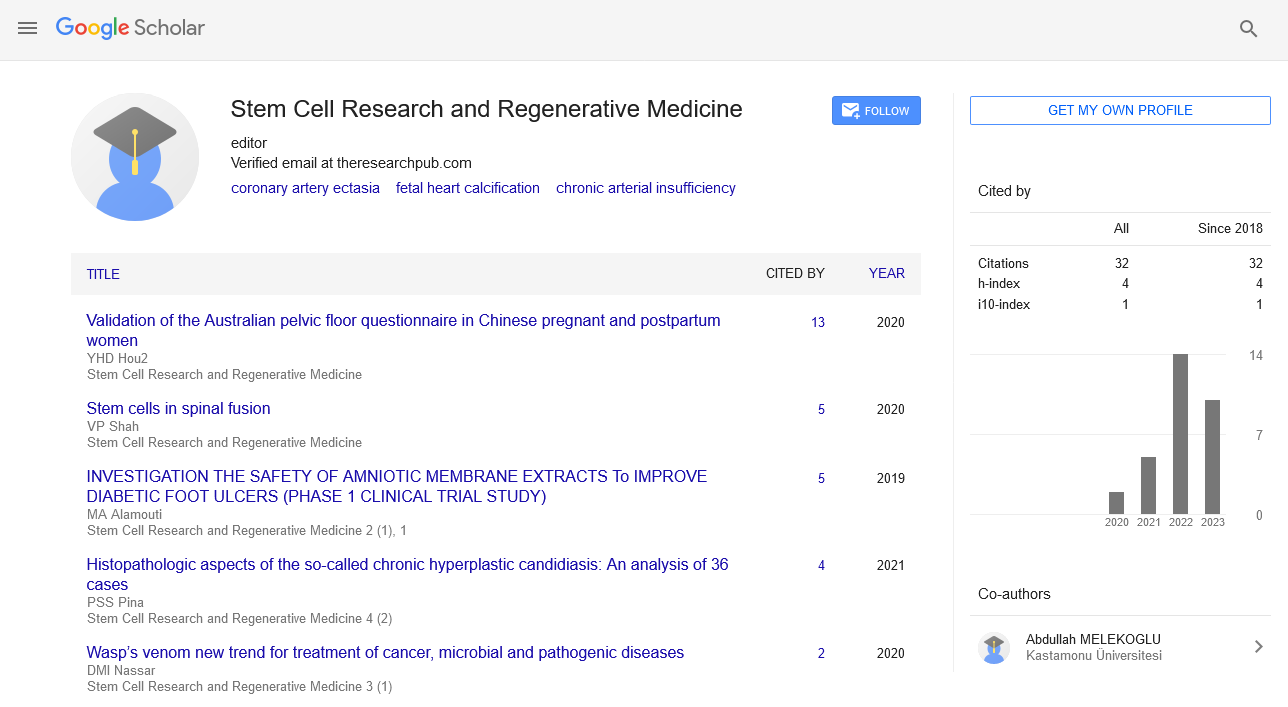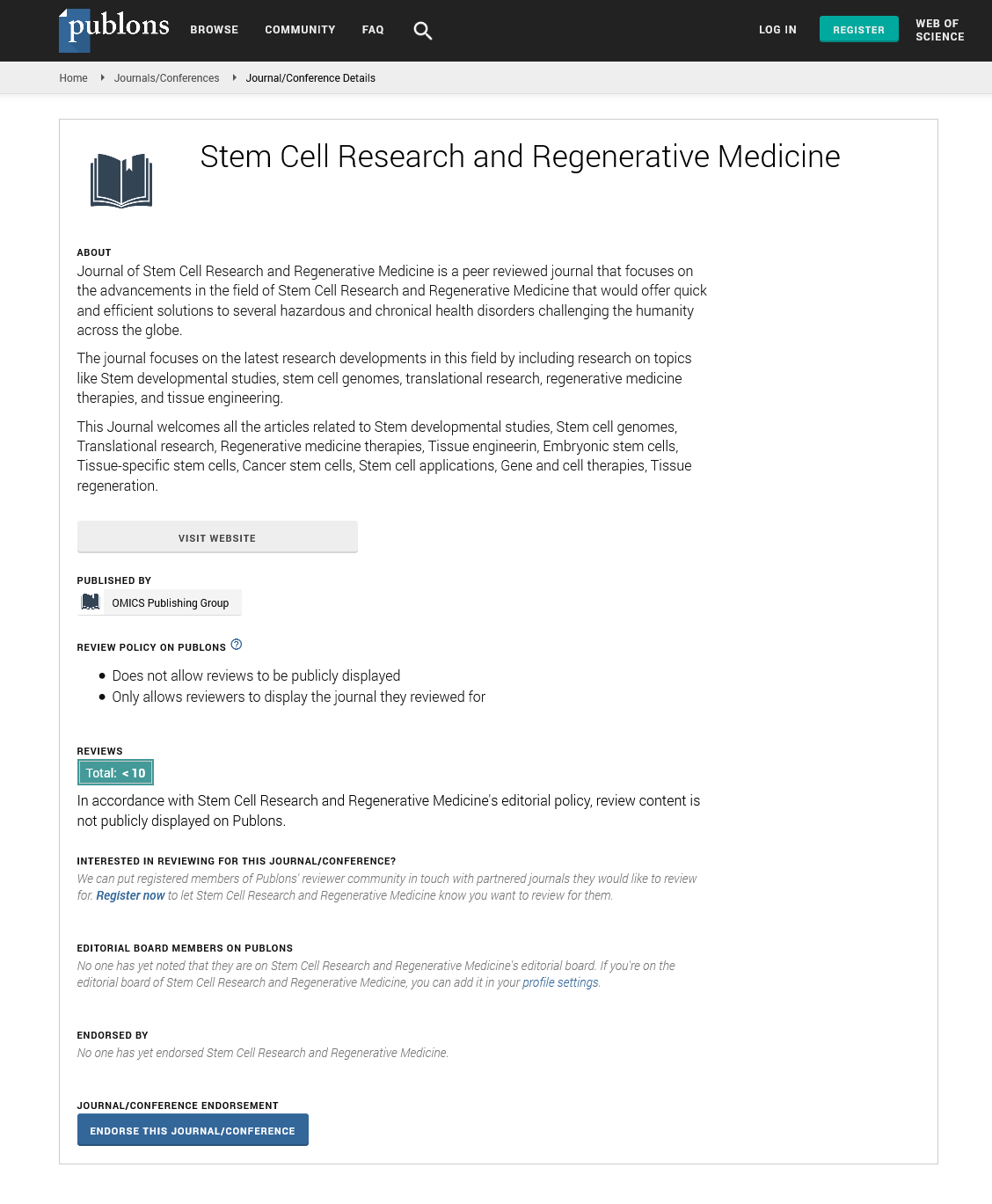Opinion Article - Stem Cell Research and Regenerative Medicine (2023) Volume 6, Issue 6
Regenerative Approaches for Addressing Age-Related Degeneration
- Corresponding Author:
- Zilun Li
Department of Medicine, Zhengzhou University, Henan, China
E-mail: Li_zilun@mail.sysu.edu.cn
Received: 13-Nov-2023, Manuscript No. SRRM-23-122128; Editor assigned: 16-Nov-2023, Pre QC No. SRRM-23-122128 (PQ); Reviewed: 30-Nov-2023, QC No. SRRM-23-122128; Revised: 07-Dec-2023, Manuscript No. SRRM-23-122128 (R); Published: 14-Dec-2023, DOI: 10.37532/SRRM.2023.6(6).153-154
Introduction
Age-related degeneration is a complex and multifaceted challenge that poses significant health and economic burdens globally. As individuals age, their tissues and organs undergo a gradual decline in function, leading to various degenerative conditions such as osteoarthritis, neurodegenerative diseases, and cardiovascular issues. Traditional approaches to managing age-related degeneration often focus on symptom relief rather than addressing the underlying causes. In recent years, regenerative medicine has emerged as a promising field offering innovative solutions to combat age-related degeneration. This article explores the potential of regenerative approaches in mitigating age-related degeneration and highlights key advancements in the field.
Description
Regenerative medicine overview: Regenerative medicine encompasses a range of therapeutic approaches that aim to restore or enhance the body’s natural healing processes. Stem cell therapy, tissue engineering, and gene therapy are among the key strategies employed in regenerative medicine. Stem cells, with their unique ability to differentiate into various cell types, hold immense potential in replenishing damaged or aging tissues. Tissue engineering involves the development of biological substitutes to restore, maintain, or improve tissue function. Gene therapy aims to modify or replace faulty genes to correct underlying genetic causes of degeneration.
Stem cell therapy: Stem cell therapy has shown promise in addressing age-related degeneration by harnessing the regenerative potential of stem cells. Mesenchymal Stem Cells (MSCs), in particular, have demonstrated the ability to differentiate into bone, cartilage, and adipose tissue, making them suitable for treating conditions such as osteoarthritis. Clinical trials have explored the use of autologous and allogeneic stem cell transplantation, demonstrating positive outcomes in terms of pain reduction and functional improvement in degenerated joints.
Tissue engineering: Tissue engineering approaches involve the creation of functional tissues or organs in the laboratory for transplantation. In the context of age-related degeneration, tissue engineering holds promise for replacing or repairing damaged tissues. Scaffold-based strategies, where cells are seeded onto three-dimensional scaffolds, provide a framework for tissue development. Researchers have made significant strides in engineering tissues such as cartilage, skin, and blood vessels, paving the way for potential applications in degenerative conditions.
Gene therapy: Advancements in gene therapy offer opportunities to target the genetic factors contributing to age-related degeneration. Researchers are exploring the use of gene editing tools like CRISPR-Cas9 to modify or replace defective genes associated with conditions such as Alzheimer’s disease and cardiovascular disorders. While gene therapy is still in its early stages for many age-related conditions, the potential to correct genetic abnormalities holds great promise for preventing and treating degenerative diseases at their roots.
Challenges and ethical considerations: Despite the promise of regenerative approaches, several challenges hinder their widespread adoption. Safety concerns, including the risk of tumor formation with stem cell therapy, need to be addressed through rigorous preclinical and clinical testing. Standardization of protocols, ethical considerations, and regulatory frameworks are crucial for ensuring the responsible development and deployment of regenerative therapies. Additionally, the high costs associated with these treatments pose barriers to accessibility, necessitating efforts to make these innovative therapies more widely available.
Neurodegenerative diseases: Age-related neurodegenerative diseases, such as Alzheimer’s and Parkinson’s, present particularly challenging targets for regenerative approaches. The complexity of the central nervous system, limited regenerative capacity of neurons, and the intricate nature of cognitive functions make developing effective therapies challenging. However, on-going research is exploring stem cell transplantation, neurotrophic factor delivery, and gene therapies to slow or reverse neuro-degeneration and enhance cognitive function in aging individuals.
Cardiovascular regeneration: The aging process significantly impacts the cardiovascular system, leading to conditions such as atherosclerosis, heart failure, and vascular dysfunction. Regenerative medicine holds promise for addressing cardiovascular degeneration by promoting the repair and regeneration of damaged tissues. Stem cell therapies, tissue-engineered blood vessels, and gene-based interventions are being explored to enhance cardiac function, restore blood vessel integrity, and mitigate the effects of age-related cardiovascular diseases.
Skeletal system regeneration: Osteoarthritis and osteoporosis are common age-related conditions affecting the skeletal system. Regenerative approaches targeting these conditions aim to restore joint function and bone density. Mesenchymal stem cells, either derived from the patient’s own tissues or from other sources, are being investigated for their potential to regenerate cartilage and bone. Tissue engineering strategies, including the development of bioactive scaffolds, provide a platform for the creation of functional bone and joint tissues.
Conclusion
Regenerative approaches offer unprecedented potential for addressing age-related degeneration by targeting the root causes of tissue and organ decline. Stem cell therapy, tissue engineering, and gene therapy represent innovative strategies that, when carefully developed and ethically implemented, could revolutionize the treatment of age-related conditions. While challenges remain, on-going research and clinical trials continue to advance our understanding of regenerative medicine’s potential in combating age-related degeneration. As the field progresses, a multidisciplinary approach involving scientists, clinicians, ethicists, and policymakers will be essential to ensure the responsible and equitable integration of regenerative therapies into mainstream healthcare, ultimately enhancing the quality of life for aging populations worldwide.


